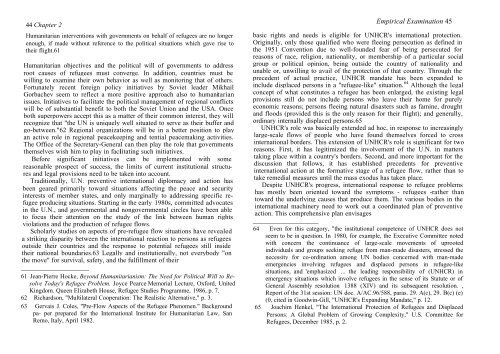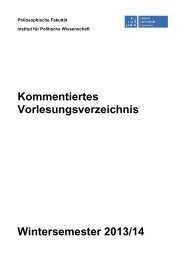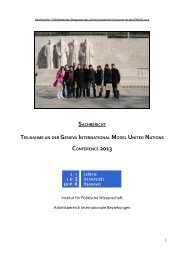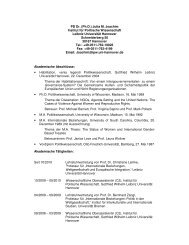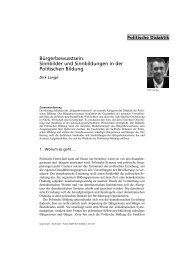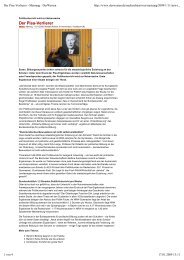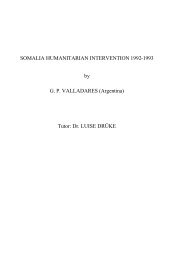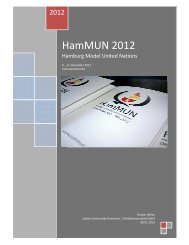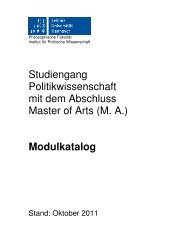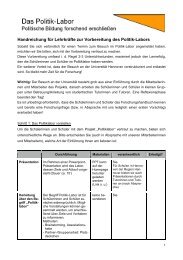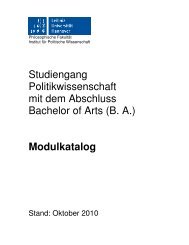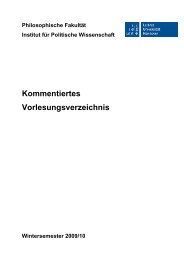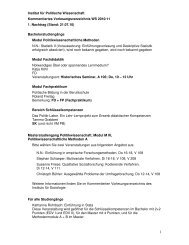Preventive Action for Refugee Producing Situations
Preventive Action for Refugee Producing Situations
Preventive Action for Refugee Producing Situations
You also want an ePaper? Increase the reach of your titles
YUMPU automatically turns print PDFs into web optimized ePapers that Google loves.
44 Chapter 2<br />
Humanitarian interventions with governments on behalf of refugees are no longer<br />
enough, if made without reference to the political situations which gave rise to<br />
their flight.61<br />
Humanitarian objectives and the political will of governments to address<br />
root causes of refugees must converge. In addition, countries must be<br />
willing to examine their own behavior as well as monitoring that of others.<br />
Fortunately recent <strong>for</strong>eign policy initiatives by Soviet leader Mikhail<br />
Gorbachev seem to reflect a more positive approach also to humanitarian<br />
issues. Initiatives to facilitate the political management of regional conflicts<br />
will be of substantial benefit to both the Soviet Union and the USA. Once<br />
both superpowers accept this as a matter of their common interest, they will<br />
recognize that "the UN is uniquely well situated to serve as their buffer and<br />
go-between."62 Regional organizations will be in a better position to play<br />
an active role in regional peacekeeping and tential peacemaking activities.<br />
The Office of the Secretary-General can then play the role that governments<br />
themselves wish him to play in facilitating such initiatives.<br />
Be<strong>for</strong>e significant initiatives can be implemented with some<br />
reasonable prospect of success, the limits of current institutional structures<br />
and legal provisions need to be taken into account.<br />
Traditionally, U.N. preventive international diplomacy and action has<br />
been geared primarily toward situations affecting the peace and security<br />
interests of member states, and only marginally to addressing specific refugee<br />
producing situations. Starting in the early 1980s, committed advocates<br />
in the U.N., and governmental and nongovernmental circles have been able<br />
to focus their attention on the study of the link between human rights<br />
violations and the production of refugee flows.<br />
Scholarly studies on aspects of pre-refugee flow situations have revealed<br />
a striking disparity between the international reaction to persons as refugees<br />
outside their countries and the response to potential refugees still inside<br />
their national boundaries.63 Legally and institutionally, not everybody "on<br />
the move" <strong>for</strong> survival, safety, and the fulfillment of their<br />
____________________<br />
61 Jean-Pierre Hocke, Beyond Humanitarianism: The Need <strong>for</strong> Political Will to Resolve<br />
Today's <strong>Refugee</strong> Problem. Joyce Pearce Memorial Lecture, Ox<strong>for</strong>d, United<br />
Kingdom. Queen Elizabeth House, <strong>Refugee</strong> Studies Programme, 1986, p. 7.<br />
62 Richardson, "Multilateral Cooperation: The Realistic Alternative," p. 3.<br />
63 Gervais J. Coles, "Pre-Flow Aspects of the <strong>Refugee</strong> Phenomen." Background<br />
pa- per prepared <strong>for</strong> the International Institute <strong>for</strong> Humanitarian Law, San<br />
Remo, Italy, April 1982.<br />
Empirical Examination 45<br />
basic rights and needs is eligible <strong>for</strong> UNHCR's international protection.<br />
Originally, only those qualified who were fleeing persecution as defined in<br />
the 1951 Convention due to well-founded fear of being persecuted <strong>for</strong><br />
reasons of race, religion, nationality, or membership of a particular social<br />
group or political opinion, being outside the country of nationality and<br />
unable or, unwilling to avail of the protection of that country. Through the<br />
precedent of actual practice, UNHCR mandate has been expanded to<br />
include displaced persons in a "refugee-like" situation. 64 Although the legal<br />
concept of what constitutes a refugee has been enlarged, the existing legal<br />
provisions still do not include persons who leave their home <strong>for</strong> purely<br />
economic reasons; persons fleeing natural disasters such as famine, drought<br />
and floods (provided this is the only reason <strong>for</strong> their flight); and generally,<br />
ordinary internally displaced persons.65<br />
UNHCR's role was basically extended ad hoc, in response to increasingly<br />
large-scale flows of people who have found themselves <strong>for</strong>ced to cross<br />
international borders. This extension of UNHCR's role is significant <strong>for</strong> two<br />
reasons. First, it has legitimized the involvement of the U.N. in matters<br />
taking place within a country's borders. Second, and more important <strong>for</strong> the<br />
discussion that follows, it has established precedents <strong>for</strong> preventive<br />
international action at the <strong>for</strong>mative stage of a refugee flow, rather than to<br />
take remedial measures until the mass exodus has taken place.<br />
Despite UNHCR's progress, international response to refugee problems<br />
has mostly been oriented toward the symptoms - refugees -rather than<br />
toward the underlying causes that produce them. The various bodies in the<br />
international machinery need to work out a coordinated plan of preventive<br />
action. This comprehensive plan envisages<br />
___________________<br />
64 Even <strong>for</strong> this category, "the institutional competence of UNHCR does not<br />
seem to be in question. In 1980, <strong>for</strong> example, the Executive Committee noted<br />
with concern the continuance of large-scale movements of uprooted<br />
individuals and groups seeking refuge from man-made disasters, stressed the<br />
necessity <strong>for</strong> co-ordination among UN bodies concerned with man-made<br />
emergencies involving refugees and displaced persons in refugee-like<br />
situations, and 'emphasized ... the leading responsibility of (UNHCR) in<br />
emergency situations which involve refugees in the sense of its Statute or of<br />
General Assembly resolution 1388 (XIV) and its subsequent resolution. ,<br />
Report of the 31st session: UN doc. A/AC.96/588, paras. 29. A(c), 29. B(c) (e)<br />
(0, cited in Goodwin-Gill, "UNHCR's Expanding Mandate," p. 12.<br />
65 Joachim Henkel, "The International Protection of <strong>Refugee</strong>s and Displaced<br />
Persons: A Global Problem of Growing Complexity," U.S. Committee <strong>for</strong><br />
<strong>Refugee</strong>s, December 1985, p. 2.


